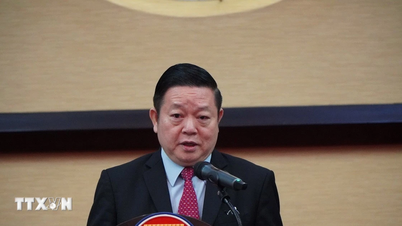However, after only 3-6 months, can students truly master the profession and firmly establish their careers, or is that just a promotional promise?

Studying for a few months helps students grasp the basic foundation, but to become a professional requires a long time of practice.
PHOTO: YEN THI
WANT TO LEARN FAST, WORK EARLY
After graduating from high school, Nguyen Anh N., from Dong Thap province (formerly Tien Giang ) decided not to take the university entrance exam. With the desire to soon have a job to return home to open a spa, N. registered for a 3-month beauty care course at a center in Go Vap area (HCMC) with a tuition fee of 24 million VND.
However, after the course, N. only grasped a few basic skills, not enough to start her own business. N. was forced to stay in Ho Chi Minh City, work as a part-time worker at a spa and register for an advanced course costing 27 million VND. It took nearly a year of studying and working for N. to gradually master her skills.
N.’s story is not unique. In fact, many people choose short-term courses to shorten the time, save money and quickly get a job. This need reflects the common mentality: wanting to learn quickly and go to work early.
Master Tran Phuong, Principal of Viet Giao College (HCMC), said that in the context of a rapidly changing labor market and increasingly high practical requirements, many students, especially young people, realize that learning quickly, working early, and having practical professional skills is an effective direction. Moreover, not everyone has the conditions to study long-term for 3-4 years. With short-term courses of 3-6 months or 1 year, students can save money, time, and quickly access real-life careers, thereby easily finding stable jobs or starting a small business.
Talking about the reasons why short-term courses attract students, Master Lam Van Quan, Chairman of the Ho Chi Minh City Vocational Education Association, said that in reality, many people choose short-term courses because they want to get a job quickly and have income soon, especially freelance workers, migrant workers, or people who want to change careers. The tuition fees for these courses are not high, the study time is short, and there are few risks. Many businesses only need workers to do basic work or operations, and can train quickly to fill the vacancies. In addition, attractive communication with the message "learn quickly - do it right away" has a strong impact on the psychology of parents and students.
"In particular, in the context of increasing university tuition fees while the starting salary of new graduates is not really commensurate, many students and parents have considered short-term vocational training as a practical option," Master Quan added.
NEED TO DISTINGUISH BETWEEN "LEARNING A VOCATION" AND "GOING OUT OF A PROFESSION"
It is not difficult to come across very attractive short-term vocational training advertisements such as: "graduate after 120 hours", "mastery after 3 months", "commitment to employment immediately after the course"... However, according to experts, these invitations are mostly to attract students rather than reflecting the true nature of vocational training.
Master Tran Phuong believes that some basic skills can be grasped after a few dozen hours of focused study, but to truly master and practice independently, students need a lot of time to practice, gain practical experience, and even go through a corporate environment.
Master Phuong noted: "It is necessary to distinguish between "learning a profession" and "entering a profession". Studying for a few months only helps to grasp the basic foundation; to enter a profession, one also needs a long period of internship and training. Any profession requires patience, repeated practice and experience in a variety of situations to be considered solid. Except for students who have been working for many years and now take a short-term vocational course to supplement their qualifications at work."
According to Master Vo Thi My Van, Principal of Saigon Tourist College of Tourism and Hospitality, studying for a few months to get a job is possible but only at a basic level, serving a specific need.
Master Lam Van Quan also pointed out the limitations of short-term courses: 3-6 months of study only helps students work at a basic level, such as assisting or performing standardized operations, under supervision. Students do not have enough capacity to become master craftsmen or independent technicians. If they do not continue to study at an advanced level, the risk of being eliminated when job requirements change is very high.

High-tech industries require long-term training.
PHOTO: YEN THI
SHORT TERM OR LONG TERM?
According to the Chairman of the Ho Chi Minh City Vocational Education Association, reality shows that some personal service fields such as beauty care, spa, nail, culinary, or customer service... can be suitable for short-term training because of standardized operations, low safety risks. High-tech industries such as mechanics, mechatronics, automobiles, industrial electricity, information technology, logistics, healthcare... require long-term training because these are fields that require a complex knowledge base, skills, safety standards and high legal responsibilities.
Master Vo Thi My Van said that to meet this need, Saigon Tourist College of Tourism and Hospitality has built a modular program. For example, the culinary industry can start with a short-term class, then students who want to upgrade to advanced cooking can transfer to the intermediate level and have their credits deducted. Thanks to that, students can get a job soon and maintain long-term development opportunities.
From the perspective of training management, Dr. Tran Manh Thanh, Principal of Bach Viet Polytechnic College, noted that opening elementary level training classes/courses with certificates must comply with regulations, specifically Circular 34/2018/TT-BLDTBXH. Dr. Thanh also recommended that when choosing to study elementary programs, learners should choose reputable and legal training institutions to ensure both skills and certificates.
Master Lam Van Quan emphasized: "Short-term training is a runway to help learners quickly find jobs. Long-term training is a long-term path to help improve skills, create a sustainable career and adaptability in the digital transformation era."
The Ho Chi Minh City Vocational Education Association also recommends that schools develop a credit accumulation model: short-term study can be transferred, linked to intermediate and college. At the same time, promote a dual training model linked to businesses, updating technology and digital skills. The State and businesses also need to work together: place training orders, grant scholarships, support employment, help learners feel secure in pursuing a career advancement path.
Source: https://thanhnien.vn/dao-tao-nghe-ngan-han-co-that-ra-nghe-sau-3-thang-185250910193049832.htm


![[Photo] General Secretary To Lam receives US Ambassador to Vietnam Marc Knapper](https://vphoto.vietnam.vn/thumb/1200x675/vietnam/resource/IMAGE/2025/9/29/c8fd0761aa184da7814aee57d87c49b3)

![[Photo] General Secretary To Lam attends the ceremony to celebrate the 80th anniversary of the post and telecommunications sector and the 66th anniversary of the science and technology sector.](https://vphoto.vietnam.vn/thumb/1200x675/vietnam/resource/IMAGE/2025/9/29/8e86b39b8fe44121a2b14a031f4cef46)
![[Photo] Many streets in Hanoi were flooded due to the effects of storm Bualoi](https://vphoto.vietnam.vn/thumb/1200x675/vietnam/resource/IMAGE/2025/9/29/18b658aa0fa2495c927ade4bbe0096df)
![[Photo] General Secretary To Lam chairs the meeting of the Central Steering Committee on preventing and combating corruption, waste and negativity](https://vphoto.vietnam.vn/thumb/1200x675/vietnam/resource/IMAGE/2025/9/29/fb2a8712315d4213a16322588c57b975)
![[Photo] National Assembly Chairman Tran Thanh Man chairs the 8th Conference of full-time National Assembly deputies](https://vphoto.vietnam.vn/thumb/1200x675/vietnam/resource/IMAGE/2025/9/29/2c21459bc38d44ffaacd679ab9a0477c)
































































































Comment (0)